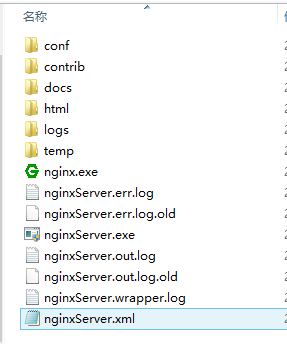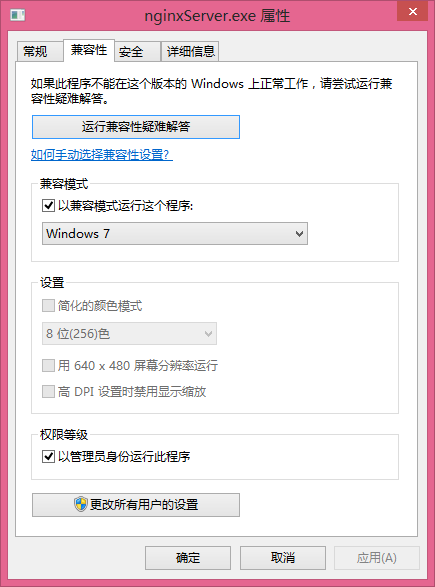Nginx简单实现网站的负载均衡
在大型网站搭建时,都会考虑如果用户量每日不断增加,大量的并发访问,会不会给网站、数据库带来崩盘的灾难。今天我们就讨论一下,现实中如何解决这些问题的一套最为容易实现的方案。
控制并发,大家都会首先考虑的就是分布式、负载均衡等经常听到的It名词。那网站如何才能实现负载均衡呢,除了世面上的一些负载均衡器外,我们有哪 些软件上的解决方案呢,这时候,Nginx、lvs 等名词就会在脑海中浮现。那这些负载均衡的软件如何使用呢,如何读者是.net工程师,大家会选择Nginx,因为它支持Windows服务器,这时候, 好多网友会批判一下,说lvs更好更优秀。其实大家不必太在意,其实都一样,只要你能掌控它们就Ok,各有优劣。Nginx配置简单,在中小型项目中使用 更为方便,下面我们看下Niginx在Windows下的配置,lvs在Linux的配置下一篇再写。
概述:使用Nginx搭建反向服务器,实现网站服务器集群负载均衡
1、下载Nginx——Windows版,(nginx-1.6.2.zip)在博客末端可下载,解压

2、使用winsw-1.8-bin(windows服务工具).exe工具将Niginx发布成Domain模式,通过Windows服务的方式控制Niginx的运行。在博客末端可下载
(1)配置 winsw运行的Xml文件,如上图:将Winsw工具移植到解压的Niginx文件下,将工具名字修改成 “nginxServer.exe”,创建一个xml配置文件“nginxServer.xml”文件,它跟工具的名字一致,当然你也可以不要改名字。 xml文件如下:
<?xml version="1.0" encoding="UTF-8" ?> <service> <id>nginx</id> <name>ngixServer</name> <description>High Performance Nginx Service</description> <executable>E:\2014newT\Practise\nginx1.62Server\nginx.exe</executable> <logpath>E:\2014newT\Practise\nginx1.62Server\</logpath> <logmode>roll</logmode> <depend></depend> <startargument>-p E:\2014newT\Practise\nginx1.62Server</startargument> <stopargument>-p E:\2014newT\Practise\nginx1.62Server -s stop</stopargument> </service>
winsw 文件配置
配置很简单主要指定Nginx.exe的位置\log位置等,可以谷歌一下Winsw看看具体的配置信息。
(2)点击nginxServer.exe安装服务,如果你是Win8以上的系统可能装不上,是因为兼容问题,调制兼容Win7模式,以管理员的身份运行即可,如图:

这时查看Windows服务,启动NginxServer服务,如图:

这时,ngixServer服务成功启动了。
3、修改Nginx配置,将代理指向服务器集群,实现网站负载均衡
在解压的Nginx文件夹下找到conf/nginx.conf文件,打开进行配置:
#user nobody; worker_processes 4;#启动的线程数 #错误的位置和级别 #error_log logs/error.log; #error_log logs/error.log notice; #error_log logs/error.log info; #pid logs/nginx.pid;#pid进程文件的位置 events { worker_connections 1024;#每个进程的最大连接数 } http { include mime.types; default_type application/octet-stream; #nginx日志格式定义,在下面可以进行引用 #log_format main '$remote_addr - $remote_user [$time_local] "$request" ' # '$status $body_bytes_sent "$http_referer" ' # '"$http_user_agent" "$http_x_forwarded_for"'; #access_log logs/access.log main; sendfile on; #tcp_nopush on; #keepalive_timeout 0; keepalive_timeout 65; upstream linuxidc.com{ server 127.0.0.1:8091; #服务器集群A server 127.0.0.1:8092; #服务器集群B } #gzip on; server { listen 8090; server_name localhost; #charset koi8-r; #access_log logs/host.access.log main; location / { root html; index index.html index.htm default.aspx; proxy_pass http://linuxidc.com; proxy_redirect default; } #error_page 404 /404.html; # redirect server error pages to the static page /50x.html # error_page 500 502 503 504 /50x.html; location = /50x.html { root html; } # proxy the PHP scripts to Apache listening on 127.0.0.1:80 # #location ~ \.php$ { # proxy_pass http://127.0.0.1; #} # pass the PHP scripts to FastCGI server listening on 127.0.0.1:9000 # #location ~ \.php$ { # root html; # fastcgi_pass 127.0.0.1:9000; # fastcgi_index index.php; # fastcgi_param SCRIPT_FILENAME /scripts$fastcgi_script_name; # include fastcgi_params; #} # deny access to .htaccess files, if Apache's document root # concurs with nginx's one # #location ~ /\.ht { # deny all; #} } # another virtual host using mix of IP-, name-, and port-based configuration # #server { # listen 8000; # listen somename:8080; # server_name somename alias another.alias; # location / { # root html; # index index.html index.htm; # } #} # HTTPS server # #server { # listen 443 ssl; # server_name localhost; # ssl_certificate cert.pem; # ssl_certificate_key cert.key; # ssl_session_cache shared:SSL:1m; # ssl_session_timeout 5m; # ssl_ciphers HIGH:!aNULL:!MD5; # ssl_prefer_server_ciphers on; # location / { # root html; # index index.html index.htm; # } #} } nginx.conf 配置
不用害怕,修改的地方很少。
(1)worker_processes 4;#启动的线程数 一般为你代理服务器的内核数
(2)在“HTTP”括弧中配置服务器群的网站发布的ip地址和端口号
upstream linuxidc.com{
server x.x.x.x:8091; #服务器A
server x.x.x.x:8092; #服务器B
}
(3)配置代理服务器的地址,即Nginx安装的服务器地址、监听端口、默认地址
server {
listen 8090; #监听端口
server_name localhost; #服务器Ip地址
#charset koi8-r;
#access_log logs/host.access.log main;
location / {
root html;
index index.html index.htm default.aspx; #默认网站首页地址
proxy_pass http://linuxidc.com;
proxy_redirect default;
}
重启Nginx Windows服务,收工完成,创建一个网站,ip、端口号、默认首页要与代理服务器Server配置一致哦,试试吧。。
引用自:http://www.cnblogs.com/alvin_xp/p/4161162.html



 浙公网安备 33010602011771号
浙公网安备 33010602011771号